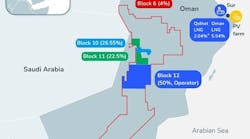By an OGJ correspondent
NICOSIA, Mar. 28 -- The US State Department announced measures to ensure continued oil shipping in the Persian Gulf, including military escorts and war-risk insurance coverage if necessary.
However, industry experts said warship escorts are no protection against mines, while US-backed war-risk coverage is rarely granted.
"The United States is taking steps to ensure the continued movement of shipping and tanker traffic to and from the Persian Gulf," Department of State spokesman Richard Boucher said Tuesday, adding, "coalition military forces will provide security if required or requested."
Boucher said the US Department of Transportation (DOT) would "provide war risk insurance for vessels, including cargoes and crew entering the region, when commercial insurance cannot be obtained on reasonable terms and conditions."
Boucher's statement, aimed largely at concerns over the possible humanitarian crisis threatening Iraq, coincided with remarks by US Presidential Spokesman Ari Fleischer on Tuesday that Iraq had deliberately mined its waters.
"You have an Iraqi regime that has laid mines in an effort to block shipments of humanitarian supplies—as well as other reasons that they laid the mines, for military purposes—the consequence of which is that the humanitarian relief, which the United States is dedicated to providing, will get there as soon as the operations can be cleared, to get the mines removed," Fleischer told reporters.
While welcoming the idea that the US would provide more military ships in the region, one naval analyst told OGJ, "Escorts are not going to provide any protection against mines. After all, during the last Gulf War, two US Navy ships actually struck mines."
Insurance raises questions
Insurers were also dismissive of claims about US-backed insurance. "War-risk coverage is a highly competitive business, and it is unlikely that any insurer would get into 'unreasonable' rates," one underwriter told OGJ. "The US government is probably not going to pick up many customers."
Joe Strassburg, chief of the marine insurance division of DOT's Maritime Administration, told OGJ that US-backed war-risk insurance was indeed rare. "We had 15 applicants for the coverage in Desert Storm and Desert Shield, and 4 of them received the coverage," Strassburg said. "We handle requests on a case-by-case basis and may offer coverage if we feel commercial rates are unreasonable. But we prefer to leave coverage to the commercial markets."
President George W. Bush approved the provision of war-risk insurance by memorandum in December 2001, and under Section 1202 of the 1936 Merchant Marine Act, Sec. of Transportation Norman Y. Mineta approved the extension for an additional year until Dec. 12.
Unlike Section 1205 insurance, which is provided to the Department of Defense on vessels chartered to them at no premium and with a full DOD indemnity, Section 1202 insurance is underwritten by DOT in return for a premium from shipowners.
"This insurance or reinsurance of vessels is available for vessels (including cargoes and crew) entering the Middle East region, whenever commercial insurance cannot be obtained on reasonable terms and conditions," DOT said in a statement.
Even DOT, however, advised, "Section 1202 authority was used very judiciously and sparingly during Operations Desert Shield/Desert Storm and it is contemplated that this new authority will be used in the same manner."
